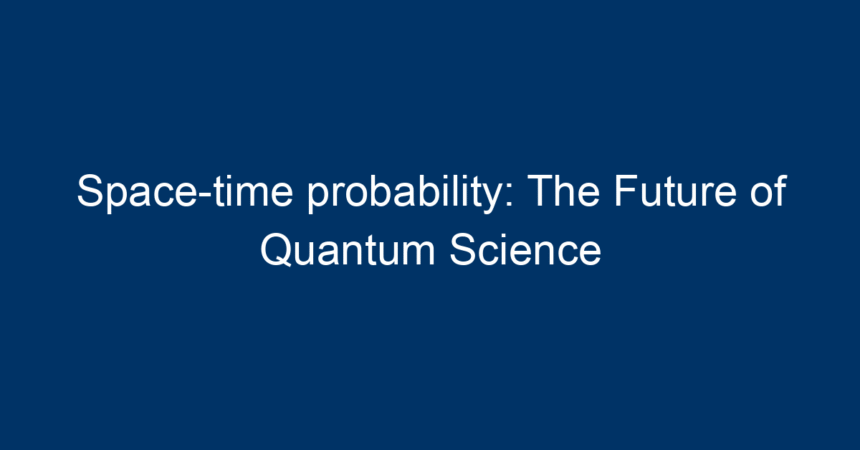Introduction
The unfolding narrative of quantum science has captivated minds for over a century, pushing the boundaries of our understanding of reality. At its core, quantum science embodies a blend of paradoxes, probabilities, and profound discoveries. One of the latest intriguing concepts that has emerged within this realm is space-time probability. This innovative notion seeks to bridge gaps between the observable universe and the probabilistic nature of quantum mechanics. In this article, we will explore what space-time probability means, its implications for the future of quantum science, and how it might transform our understanding of existence itself.
Understanding Space-Time Probability
What is Space-Time?
To delve into the essence of space-time probability, we first need to understand space-time itself. In Einstein’s theory of relativity, space-time is a four-dimensional continuum where three dimensions are spatial (length, width, height) and one dimension is temporal (time). Events occur at specific coordinates within this amalgamation of space and time. The interaction between these dimensions creates a fabric upon which the universe operates.
The Role of Probability in Quantum Mechanics
In quantum mechanics, probability plays a pivotal role. Unlike classical physics, where certainty reigns, quantum phenomena often embrace uncertainty. Rather than determining a specific outcome, quantum mechanics assigns probabilities to different possibilities. This inherent uncertainty is famously illustrated by the double-slit experiment, where light behaves as both a particle and a wave, leading scientists to conclude that particles exist in a state of superposition until observed.
Defining Space-Time Probability
Space-time probability extends this probabilistic nature across the dimensions of space and time. It suggests that the events we observe and experience are not isolated occurrences but are deeply intertwined within the fabric of space-time. This interconnectedness raises profound questions about causality, determinism, and the nature of reality itself.
Implications of Space-Time Probability in Quantum Science
A New Paradigm in Understanding Reality
The concept of space-time probability challenges traditional notions of realism. Instead of defining events as singular occurrences, it posits that they exist within a spectrum of probabilities over space-time. This shift can potentially lead to new theories about the universe, impacting various fields, including cosmology, particle physics, and even philosophy.
Quantum Entanglement and Space-Time Probability
One of the most astonishing manifestations of quantum science is quantum entanglement—a phenomenon where particles become interconnected, regardless of distance. Space-time probability provides a framework to understand entangled particles not just as instances in space but as entities that occupy a shared probability landscape across both dimensions. This perspective may aid in solving current enigmas, like the “spooky action at a distance” attributed to entanglement.
The Nature of Time in Quantum Science
Traditional views of time suggest it moves unidirectionally from past to future. However, incorporating space-time probability might allow for a reevaluation of time’s role in quantum phenomena. What if time is merely another dimension in which probabilities unfold? This notion could pave the way for groundbreaking insights into time travel and the multiverse theory, as events could be perceived through multiple probabilities existing simultaneously.
The Technological Impact of Space-Time Probability
Quantum Computing
Space-time probability could revolutionize quantum computing. Current quantum computers exploit quantum bits (qubits) that exist in multiple states, enabling complex calculations. If scientists can harness space-time probability, we might see more efficient algorithms, enhanced processing power, and breakthroughs in quantum communication systems.
Quantum Cryptography
Moreover, in the sphere of quantum cryptography, incorporating space-time probability could lead to fundamentally secure communication systems. By understanding the probabilistic nature of information transmission across space-time, we can develop encryption methods that are resilient to attacks, ensuring data integrity in a digital age.
Adaptation in Energy Systems
Energy systems could also benefit from space-time probability concepts. By understanding how energy states exist in a probabilistic realm, engineers can innovate ways to store and harness energy more efficiently. This could lead to advancements in renewable energy technologies, pushing the boundaries of current systems.
The Philosophical Ramifications of Space-Time Probability
Reality and Perception
The implications of space-time probability extend beyond the realm of science into philosophical discourse. If reality is a tapestry of probabilities, how does this affect our understanding of existence? What does it mean for free will and determinism? This paradigm shift necessitates deep introspection and could lead to new philosophical frameworks that reconcile quantum mechanics with human experience.
Ethical Considerations
As we dive deeper into the understanding of space-time and its probabilistic nature, ethical questions arise. The power to manipulate quantum states may have unforeseen consequences. Ethical guidelines need to be established to govern the application of quantum technologies, ensuring they are used for the greater good, rather than for manipulation or harm.
Future Directions in Quantum Science
Interdisciplinary Collaboration
To fully explore the potential of space-time probability, interdisciplinary collaboration between physicists, mathematicians, ethicists, and philosophers is crucial. Collective efforts will yield diverse perspectives, fostering innovation and understanding.
Advancements in Research
Ongoing research into quantum physics will likely unveil more about space-time probability. As experimental techniques evolve, scientists will be positioned to test theories and explore the central tenets of quantum science with unparalleled precision.
Embracing Uncertainty
Perhaps one of the most valuable lessons from space-time probability is to embrace uncertainty. Acknowledging that not everything is predetermined can foster greater creativity and flexibility in problem-solving, paving the way for breakthrough innovations.
Conclusion
The emergence of space-time probability stands at the crossroads of quantum science and philosophical inquiry. As researchers delve deeper into this concept, it holds the promise of reshaping our understanding of reality, redefining technological advancement, and enhancing our ethical frameworks. The future beckons with exciting possibilities, urging us to explore the intricate dance of probabilities woven through the fabric of space-time.
To engage with the future of quantum science, connect with research communities, explore educational resources, and challenge conventional thinking. The journey into the world of space-time probability is just beginning—let’s embrace it wholeheartedly.
Actionable Insights
-
Stay Informed: Follow reputable sources in quantum science to keep abreast of the latest developments in space-time probability.
-
Engage in Discussions: Join forums and groups that explore the intersection of quantum mechanics and philosophy.
-
Explore Technology: Consider studying quantum computing and cryptography to understand how space-time probability is influencing technology today.
- Reflect Philosophically: Take time to contemplate the ethical implications of advances in quantum science and their potential impact on society.
By embracing the future ignited by space-time probability, we open ourselves to a universe rich with possibilities, waiting to be explored.




